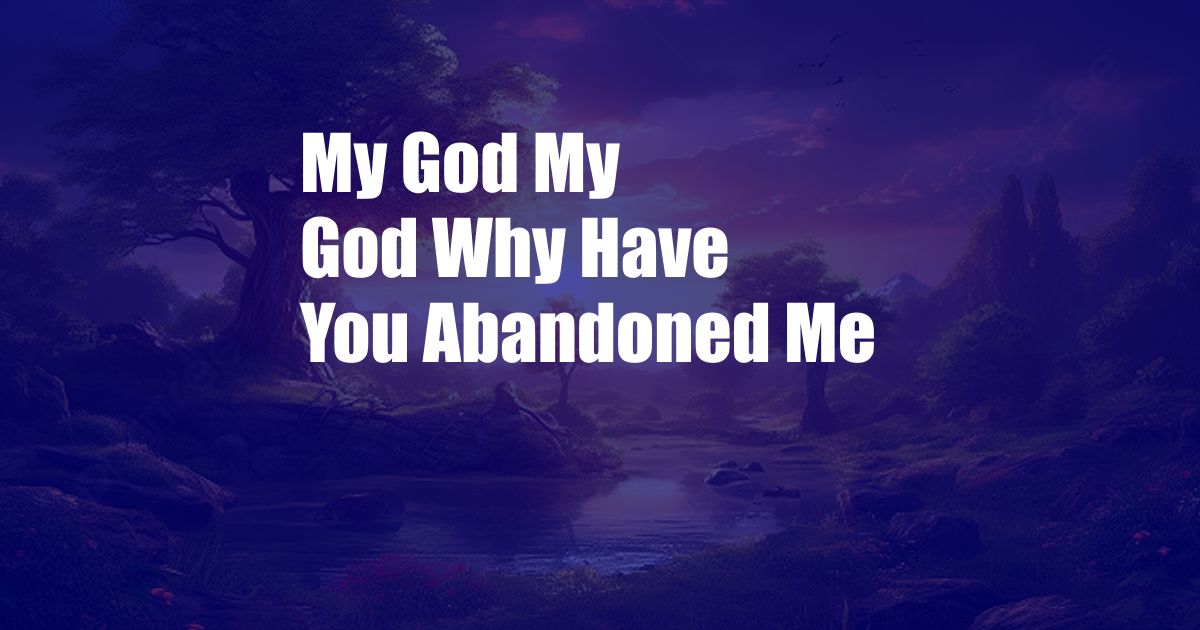
My God, My God, Why Have You Abandoned Me?
As I stood there in the darkness, surrounded by the ruins of my life, a wave of despair washed over me. I had lost everything—my family, my home, my job. I felt utterly alone and abandoned. In that moment, I couldn’t help but cry out to God with the same anguished words that Jesus uttered on the cross: “My God, my God, why have you abandoned me?”
This cry is one that has echoed through the ages, a testament to the profound pain and alienation that can accompany human suffering. It is a cry that is born out of a sense of hopelessness, a feeling that we have been forsaken by the one we love and trust.
Searching for Answers
In the face of such despair, it is natural to search for answers. We may wonder why God would allow us to suffer, why he would seem to abandon us in our time of need. Some may turn to religion for comfort, seeking solace in the promise of a better life to come. Others may turn to philosophy, searching for wisdom and understanding in the face of adversity.
Theological Explanations
There are many different theological explanations for why God allows suffering. Some believe that suffering is a punishment for sin, while others believe that it is a necessary part of our growth and development. Still others believe that suffering is a mystery that we cannot fully understand.
The Bible itself offers a variety of perspectives on suffering. In the book of Job, we see a righteous man who suffers greatly. Job’s friends argue that his suffering is a punishment for sin, but Job himself maintains his innocence. In the end, God does not provide a clear answer to Job’s question of why he suffers.
Philosophical Explanations
Philosophers have also grappled with the problem of suffering. Some argue that suffering is an inherent part of the human condition. We are finite creatures, and as such, we are subject to pain, loss, and disappointment. Others argue that suffering is a necessary evil, a catalyst for growth and compassion.
Finding Hope in the Darkness
While there may not be any easy answers to the question of why God allows suffering, there are ways to find hope in the darkness. One way is to focus on the things that we can control. We cannot control the circumstances that we find ourselves in, but we can control how we respond to them.
Another way to find hope is to connect with others who have experienced similar suffering. Sharing our stories can help us to feel less alone and can provide us with support and encouragement.
Expert Advice
Here are some tips from experts on how to cope with suffering:
- Allow yourself to grieve. It is important to acknowledge your pain and allow yourself to feel the full range of emotions that come with suffering.
- Talk to someone you trust. Sharing your feelings with a friend, family member, therapist, or spiritual leader can help you to process your emotions and find support.
- Find ways to help others. When we focus on helping others, we can take our minds off of our own suffering and find purpose in life.
- Practice self-care. Take care of your physical and mental health by eating healthy, getting enough sleep, and exercising regularly.
- Find hope in the darkness. Even in the darkest of times, there is always hope. Focus on the things that you can control and connect with others who can provide support and encouragement.
By following these tips, you can find ways to cope with suffering and find hope in the darkness.
FAQ
Q: Why does God allow suffering?
A: There are many different theological and philosophical explanations for why God allows suffering. Some believe that suffering is a punishment for sin, while others believe that it is a necessary part of our growth and development.
Q: How can I cope with suffering?
A: There are many ways to cope with suffering. Some tips include allowing yourself to grieve, talking to someone you trust, finding ways to help others, practicing self-care, and finding hope in the darkness.
Q: Is there hope in the darkness?
A: Yes, even in the darkest of times, there is always hope. Focus on the things that you can control and connect with others who can provide support and encouragement.
Conclusion
The cry “My God, my God, why have you abandoned me?” is a cry that has been uttered by countless people throughout history. It is a cry that is born out of a sense of hopelessness and despair. However, it is important to remember that even in the darkest of times, there is always hope.
By following the tips in this article, you can find ways to cope with suffering and find hope in the darkness. Are you interested in this topic?